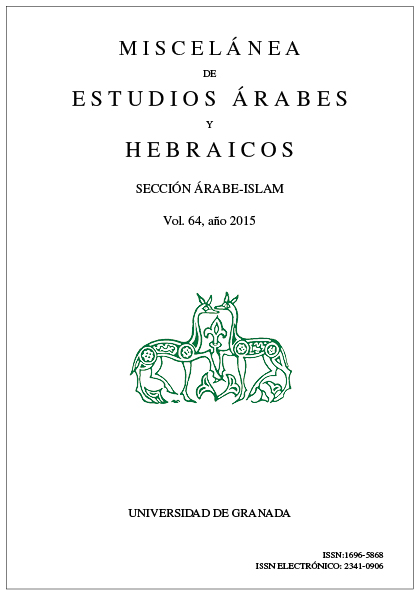Dissertation on the hair. Edition and translation of anonymous text included in the miscellaneous manuscript nº 888 of the Royal Library of the Monastery of San Lorenzo de El Escorial
Keywords:
Arabic medicine, Hair, Arabic manuscripts, Medieval Arabic pharmacologyAbstract
Arabic edition and the Spanish translation of an anonymous short scientific treatise, Dissertation on the hair, included in the miscellaneous manuscript nº 888 of the Royal Library of the Monastery of San Lorenzo de El Escorial, providing reasons for hair growth and significance in the body, differences between hair of men, women and children, and characteristics and qualities of people with curly, straight, blond or dark hair and capillary diseases. The whole manuscript consists of fourteen parts written by the same copyist in 170 folios under the general title of The book of medical and philosophical curiosities and utilities, covering several subjects from both branches of knowledge.
Downloads
Downloads
Published
How to Cite
Issue
Section
License
The authors publishing their work in this journal agree to the following terms and conditions:
1. The authors retain the copyright and give the journal the right to be the first publication of the work and also to be licensee under a Creative Commons Attribution License which allows others to share the work, provided the author of the work and the initial publication in this journal are acknowledged.
2. Authors may make additional agreements separately for the non-exclusive distribution of the version of the work published in the journal (for example, putting it in an institutional repository or publishing it in a book), with acknowledgement of its initial publication in this journal.
3. Authors are allowed and encouraged to electronically disseminate (for example, in institutional repositories or on their own web page) the published version of their works (publisher's post-print version) or, if not possible, the author's reviewed and accepted post-print version. This is to facilitate productive exchanges, and allow for earlier and greater citation by third parties of the published works (See The Effect of Open Access).
4. The journal accepts no responsibility for the opinions expressed by the authors.















